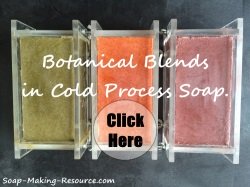Coconut Oil for Soap Making
Many soap makers use coconut oil for soap making because of the incredible lather it produces, the hardness it adds to the soap, and, when used in moderation, its great moisturizing abilities.
Coconut Oil (76 Degree) (Out of Stock) | ||
| Coconut Oil (76 Degree) 13.5 Ounces | $4.75 | Out of Stock |
| Coconut Oil (76 Degree) 1.5 Pounds | $7.95 | Out of Stock |
| Coconut Oil (76 Degree) 3 Pounds | $12.95 | Out of Stock |
| Coconut Oil (76 Degree) 7.5 Pounds (1 Gallon) | $20.50 | Out of Stock |
| Coconut Oil (76 Degree) 5 Gallons (37.5 Pounds) | $87.75 | Out of Stock |
Soap Making Resource's quality products: |
|||
 |
 |
 |
 |
 |
 |
 |
 |
Free delivery on orders $200 or more *Contiguous USA only |
|||
Sign up for the Soap Making Resource e-Newsletter. |
|||
Orders Outside the USA Please Click Here. We Ship Worldwide! |
|||
There are a few main types of coconut oil that can be used for soap making. These kinds include 76 degree, 92 degree, virgin and fractionated coconut oil.
At the time of this writing, I have only used 76 degree coconut oil for soap making. It works great, so I never felt the need to try the other types! That being said, the info on this page is dealing mostly with the 76 degree variety. Further down, I will briefly go over what I know about the other types of coconut oil used to make soap.
|
Sign Up Today!
*Your information is SAFE with us! |
Here are the approximate fatty acid, iodine, and SAP values for coconut oil:
| Lauric | 48% |
| linoleic | 2% |
| linolenic | 0% |
| Oleic | 8% |
| Palmitic | 9% |
| Ricinoleic | 0% |
| stearic | 3% |
| myristic | 19% |
| Iodine Value | 10 |
| SAP Value Sodium Hydroxide | .183 |
| SAP Value Potassium Hydroxide | .257 |
When using coconut oil for soap making, here are some of the attributes you will see within your finished product:
| Bubbly lather | Yes |
| Creamy/Stable lather | Some |
| Cleansing | Strong |
| Conditioning | Some |
| Hardness | Yes |
The lather produced by coconut oil is absolutely incredible. In fact, this oil produces such a great lather that 100% coconut oil soap will actually suds in salt water!
Furthermore, coconut oil is a wonderful ingredient to use in soap making to add hardness to your bar. This aspect of coconut oil is extremely valuable especially when you are creating soap with other oils that alone would produce a softer product.
How Much Coconut Oil should I use for Soap Making?
The amount of coconut oil you use for soap making depends largely on what type of bar you are trying to produce. For instance, if I wanted to make a mild soap that is to be used on the face, then I personally wouldn't let it take up more then 20% of the oils used. It's kind of interesting... Too much coconut oil will produce an overly drying product, while smaller amounts will actually add moisturizing properties to your soap. For this reason, when creating a facial soap that needs to be mild, make sure that you use coconut oil in moderation... Just don't go overboard with it!
If, however, you want to make a soap that has an incredible lather, cleans extremely well, and is very hard, then I would use coconut oil during the soap making process much more liberally. I would even allow it to take up 100% of the oils used especially if I'm trying to create a sea soap that's appealing to a maritime area. As many of you know, 100% coconut oil soap is often referred to as a "seaman's soap" mainly because of the fact that it does have the ability to produce a lather in salt water. One word of advice... When making 100% coconut oil soap, be sure to superfat at a very high percentage or else your product will be too harsh to use. Anywhere between a 18% and 20% superfat will do it!
Different Types of Coconut Oil for Soap Making
So what's up with the different types of coconut oil for soap making? As I stated before, I only use 76 degree in my soap batches, so I can't really tell you from first hand experience how the soaps will turn out when using the different types. I can, however, let you know what I've heard from other soap makers and what I've learned from my own personal research when I was first deciding which type to use for myself:
76 degree coconut oil: This type of coconut oil will become a liquid at 76 degrees Fahrenheit. It produces a great lather, and adds hardness to the bar. From my observations, it seems that this is the most popular type for soap making.
92 degree coconut oil: This type of coconut oil will become a liquid at 92 degrees Fahrenheit. I've heard that it is more hydrogenated then the 76 degree variety. Some soap makers who use this type of coconut oil for soap making say that it will produce a harder bar, but does not lather as nicely as the 76 degree coconut oil Variety.
Virgin coconut oil: The coconut oil industry is not like the olive oil industry. At the time of this writing, there's no actual standard that makes coconut oil "virgin". Some companies claim that virgin coconut oil has more of a food grade standard as only the fresh meat of the coconut is used to produce the oil rather then the dried copra. In my opinion, you can't really go by this because any company (even those that use the dried copra to produce the oil) can label their coconut oil as "virgin" without meeting any specific criteria issued by a third party outfit. As far as I can tell, it's more of a label appeal type of thing that some companies use. I've never actually met a soap maker who used virgin coconut oil to make their product so I can't really comment on any type of differences (if there are any) that you will see in your soap. My thoughts: why pay more for the "virgin" label when you can get the same thing for less money by going with the regular stuff? Trust me, non-virgin coconut oil works great... It hasn't failed me yet and I love the soap it produces!
Fractionated coconut oil: In fractionated coconut oil, long chain triglycerides are taken away leaving only saturated fats. As I've never used this type of coconut oil, I have no clue how this would effect the soap. I do know, however, that fractionated coconut oil has a longer shelf life and can withstand greater heat then the standard types.
Hopefully you've learned a little bit about using coconut oil for soap making, the benefits it offers, and the different types available. As you continue learning how to make soap, don't be surprised if this oil becomes a dominant ingredient in your soap making arsenal.
Return from coconut oil for soap making to the soap making ingredients main page.











